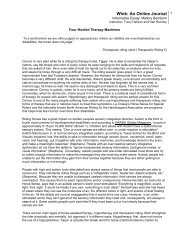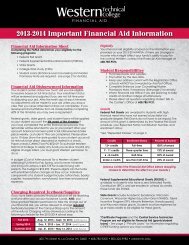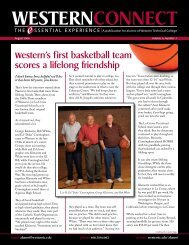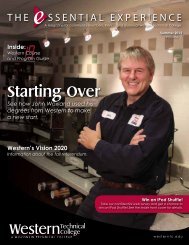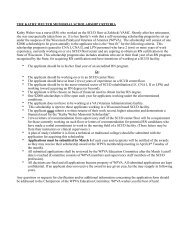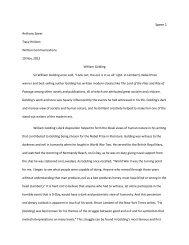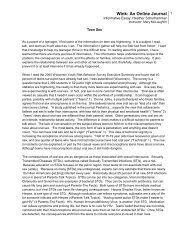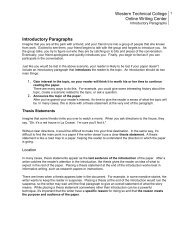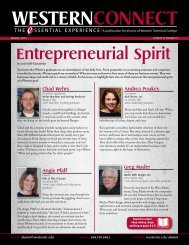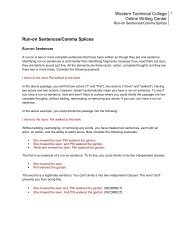The History of Western Technical College
The History of Western Technical College
The History of Western Technical College
You also want an ePaper? Increase the reach of your titles
YUMPU automatically turns print PDFs into web optimized ePapers that Google loves.
May 10 <strong>The</strong> La Crosse Vocational Civic Choir, under the direction <strong>of</strong> Harold Youngberg, presented its annual<br />
concert.<br />
May 12 National Conference <strong>of</strong> Christians and Jews brought three famous U.S. religious leaders to<br />
La Crosse for an evening round table discussion on “America’s World Task”.<br />
May 15 Rt. Rev. Msgr. Fulton J. Sheen, considered one <strong>of</strong> the greatest orators in modern history, gave a lecture<br />
on “<strong>The</strong> Burden on the <strong>Western</strong> World”. This lecture was presented under the auspices <strong>of</strong> the La<br />
Crosse Knights <strong>of</strong> Columbus.<br />
May 19 A “Salute to La Crosse” band recital was presented by the Sixth Service Command Training Center band<br />
from Camp McCoy, on behalf <strong>of</strong> the entire post, as appreciation for the services to the solders at<br />
McCoy given by La Crosse individuals, firms and organizations. <strong>The</strong> crowd was the largest on record –<br />
an estimated 1,600 persons attended. “Probably where you are, it doesn’t look as though war has a<br />
brighter side. But it had one last week for the home folks when the Camp McCoy Post Band<br />
presented a musical tribute the La Crosse’s hospitality in a two-hour concert.”<br />
October 15 <strong>The</strong> <strong>Western</strong> Wisconsin Education Association held its meeting in La Crosse.<br />
November 17 <strong>The</strong> Women’s Army Corps (WAC) stationed at Camp McCoy presented a show <strong>of</strong> music, dancing, and<br />
comedy “drama.”<br />
<strong>The</strong> morale value <strong>of</strong> entertainment to the men in service cannot be questioned. In 1943, the Vocational Civic Orchestra<br />
under the direction <strong>of</strong> Leigh Eldor and the Vocational Civic Choir directed by Harold Youngberg went to Camp McCoy and<br />
gave a couple <strong>of</strong> entertainments that brought wild cheers and many compliments from the men in khaki.<br />
<strong>The</strong> war wasn’t over, but planning for a post-war era was begun in 1944 . . . At the annual meeting in February 1944 <strong>of</strong><br />
the La Crosse Chamber <strong>of</strong> Commerce, guest speaker <strong>of</strong> the evening Frank O. Holt, director <strong>of</strong> public relations at the<br />
University <strong>of</strong> Wisconsin, spoke on “Postwar Planning and Business Statesmanship”. Director Coleman presented<br />
certificates <strong>of</strong> honor signed by President Roosevelt and General Hershey to nonpaid members <strong>of</strong> the county price and<br />
rationing board. <strong>The</strong> Chamber members continued their discussion in<br />
March 1944 regarding the rehabilitation <strong>of</strong> returning soldiers both now and immediately after the war, as well<br />
as general community plans.<br />
<strong>The</strong> Budget for 1944 submitted to the La Crosse Common Council requested $58,290 for that year. <strong>The</strong> budget for 1944<br />
was $10,850 less than that requested for 1943. <strong>The</strong> reason given by the Vocational Board for reducing the budget at a<br />
time when costs were rising included:<br />
� “Our enrollment is smaller than usual. Especially is this true in our day school. This made it possible for us to<br />
release a number <strong>of</strong> teachers. <strong>The</strong> teachers, by the way, are all working in defense plants or else are in the service <strong>of</strong><br />
our country.<br />
� “For more than two years, we have been carrying on an extensive War Production Training program. During that<br />
time, some <strong>of</strong> the overhead for the entire school has been paid by the U. S. Government . . . utilities, janitorial, and<br />
others<br />
� “. . . We have worked out a system <strong>of</strong> management which places our school on an efficient business basis.”<br />
In 1944, the Vocational Board hired a Homebound instructor to teach a variety <strong>of</strong> crafts to persons who were unable to<br />
leave their homes. <strong>The</strong> Homebound program began on March 20, and was part <strong>of</strong> the State Rehabilitation program.<br />
Delilah Nelson was employed at a salary <strong>of</strong> $175 per month for 12 months (1944-45) and that $175 per month salary also<br />
covered her traveling expenses. Taking training under an unusually qualified teacher, 12 adults unable to leave their<br />
homes, developed an industry that enabled them to become partially self-supporting. Articles made by these people<br />
were placed on sale at the Tiny Tot and Young Folks Toggery shop (then at 309 Main Street), and at Northern States<br />
Power Company (then at 122 Fifth Avenue South).<br />
On March 28, 1944, U.S. Republican presidential candidate Wendell L. Willkie made two appearances in<br />
La Crosse, one being a public meeting in the Vocational School Auditorium. Willkie tried unsuccessfully to unseat<br />
President Franklin D. Roosevelt in 1940. He was renominated in 1944, and after his defeat in the Wisconsin primary, he<br />
withdrew from the race.<br />
In March 1944, the doors <strong>of</strong> the Vocational School were open to Camp McCoy soldiers wanting to study a trade in their<br />
leisure time. A variety <strong>of</strong> specialized vocational training was available to Camp McCoy personnel at the La Crosse<br />
Vocational School. Two types <strong>of</strong> courses were available: <strong>The</strong> first was trade preparatory for learning





